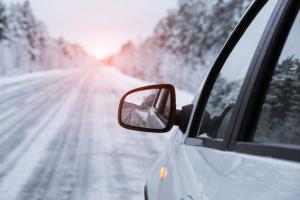Packing the right insurance for your road trip

Americans are logging more and more miles via car than ever before: 3.23 trillion in 2021. According to the Federal Highway Administration, this is the highest of all time.
All of those extra miles mean the risk of an auto accident is greater than ever, too. Fortunately, with a little preparation, and the right insurance coverage in place, an accident doesn’t have to turn into major disruption of your travel plans.
To travel with peace of mind, keep these Ps in mind.
Protect
- Start by getting some advice from your local independent insurance agent. Your agent can assess your insurance risks to help protect against the unexpected.
- Consider trip interruption coverage, which reimburses certain expenses when you are involved in a covered accident far from home. Food, lodging, transportation, and costs to get your vehicle to a repair shop are often covered.
- If an accident takes your vehicle off the road for a prolonged period, you’ll probably need to rent a car. With single limit rental reimbursement, you’ll be able to select the “large” or “luxury SUV” for this rental, when a preferred rental provider is used.
- If you are a frequent renter, options like rental car coverage offer extra protection in the event you get in an accident with a rental car. This includes costs such as reimbursement to the rental agency for vehicle depreciation, or loss of income due to the vehicle being out of service, expenses that could otherwise come out of pocket.
Plan
- Know your trip and your route.
- Know what Mother Nature may have planned. Anticipating bad weather can save time and trouble.
- Be sure you are well rested. Get a good night’s sleep before leaving and plan to stop for breaks every couple of hours. Try to stretch your legs or have a snack when you stop.
- Share the driving with someone else, if possible. If you are driving alone, listen to the radio and open your window enough to get some fresh air.
- Insist that everyone, including older children and adults, buckle their seat belts – even when riding in the back seat.
- If you are traveling with younger children, be sure all car and booster seats are properly installed and secured.
Coverage tip: with Hanover Platinum Auto child car seats are covered, up to $300, if damaged in an accident.
Prep
- Clean all vehicle lights, reflectors and windows.
- Check your tires, belts, hoses, engine oil and fluids.
- Be sure your spare tire is ready for use and that you know how to operate your car jack. Check to see that all of the car’s wheels can be removed.
- It’s always a good idea to bring tools, a flashlight, reflective triangles and road flares.
- For longer trips, arrange for a qualified mechanic to service your vehicle before the trip.
Coverage tip: consider roadside assistance coverage. The Hanover offers this option to all of their auto customers, providing coverage for towing, lockout service, flat tires, delivery of gas and oil, and more.
Pack
- Do not overpack. You will want to be sure you and others are comfortable and that the driver’s view is not impaired in any way.
- Use interior tie-down hooks to secure luggage and other large or heavy objects. A 25-pound suitcase can become a heavy projectile if you come to a sudden stop at 60 miles per hour.
- Store cargo on your vehicles roof only when necessary, and then, pack carefully. Excess cargo on roof racks and in cargo carriers can alter a vehicle’s center of gravity and increase the risk of a rollover.
- Use a pet barrier, harness or crate, for your safety, your pet’s safety and the safety of others on the road.
Coverage tip: The Hanover offers pet injury coverage, which provides up to $2,500 in expenses related to injury (or burial) if your dogs or cats are involved in an accident.
Avoid tr-interruption-ip
Your local independent agent can provide a “road map” to a safe journey, with tips and coverage to help you keep all the stops on your trip scenic ones.
Related resources
Packing the right insurance for your road trip
Americans are logging more and more miles via car than ever before: 3.23 trillion in 2021. According to the Federal Highway Administration, this is the highest of all time.
All of those extra miles mean the risk of an auto accident is greater than ever, too. Fortunately, with a little preparation, and the right insurance coverage in place, an accident doesn’t have to turn into major disruption of your travel plans.
To travel with peace of mind, keep these Ps in mind.
Protect
- Start by getting some advice from your local independent insurance agent. Your agent can assess your insurance risks to help protect against the unexpected.
- Consider trip interruption coverage, which reimburses certain expenses when you are involved in a covered accident far from home. Food, lodging, transportation, and costs to get your vehicle to a repair shop are often covered.
- If an accident takes your vehicle off the road for a prolonged period, you’ll probably need to rent a car. With single limit rental reimbursement, you’ll be able to select the “large” or “luxury SUV” for this rental, when a preferred rental provider is used.
- If you are a frequent renter, options like rental car coverage offer extra protection in the event you get in an accident with a rental car. This includes costs such as reimbursement to the rental agency for vehicle depreciation, or loss of income due to the vehicle being out of service, expenses that could otherwise come out of pocket.
Plan
- Know your trip and your route.
- Know what Mother Nature may have planned. Anticipating bad weather can save time and trouble.
- Be sure you are well rested. Get a good night’s sleep before leaving and plan to stop for breaks every couple of hours. Try to stretch your legs or have a snack when you stop.
- Share the driving with someone else, if possible. If you are driving alone, listen to the radio and open your window enough to get some fresh air.
- Insist that everyone, including older children and adults, buckle their seat belts – even when riding in the back seat.
- If you are traveling with younger children, be sure all car and booster seats are properly installed and secured.
Coverage tip: with Hanover Platinum Auto child car seats are covered, up to $300, if damaged in an accident.
Prep
- Clean all vehicle lights, reflectors and windows.
- Check your tires, belts, hoses, engine oil and fluids.
- Be sure your spare tire is ready for use and that you know how to operate your car jack. Check to see that all of the car’s wheels can be removed.
- It’s always a good idea to bring tools, a flashlight, reflective triangles and road flares.
- For longer trips, arrange for a qualified mechanic to service your vehicle before the trip.
Coverage tip: consider roadside assistance coverage. The Hanover offers this option to all of their auto customers, providing coverage for towing, lockout service, flat tires, delivery of gas and oil, and more.
Pack
- Do not overpack. You will want to be sure you and others are comfortable and that the driver’s view is not impaired in any way.
- Use interior tie-down hooks to secure luggage and other large or heavy objects. A 25-pound suitcase can become a heavy projectile if you come to a sudden stop at 60 miles per hour.
- Store cargo on your vehicles roof only when necessary, and then, pack carefully. Excess cargo on roof racks and in cargo carriers can alter a vehicle’s center of gravity and increase the risk of a rollover.
- Use a pet barrier, harness or crate, for your safety, your pet’s safety and the safety of others on the road.
Coverage tip: The Hanover offers pet injury coverage, which provides up to $2,500 in expenses related to injury (or burial) if your dogs or cats are involved in an accident.
Avoid tr-interruption-ip
Your local independent agent can provide a “road map” to a safe journey, with tips and coverage to help you keep all the stops on your trip scenic ones.
Related resources
Packing the right insurance for your road trip
Americans are logging more and more miles via car than ever before: 3.23 trillion in 2021. According to the Federal Highway Administration, this is the highest of all time.
All of those extra miles mean the risk of an auto accident is greater than ever, too. Fortunately, with a little preparation, and the right insurance coverage in place, an accident doesn’t have to turn into major disruption of your travel plans.
To travel with peace of mind, keep these Ps in mind.
Protect
- Start by getting some advice from your local independent insurance agent. Your agent can assess your insurance risks to help protect against the unexpected.
- Consider trip interruption coverage, which reimburses certain expenses when you are involved in a covered accident far from home. Food, lodging, transportation, and costs to get your vehicle to a repair shop are often covered.
- If an accident takes your vehicle off the road for a prolonged period, you’ll probably need to rent a car. With single limit rental reimbursement, you’ll be able to select the “large” or “luxury SUV” for this rental, when a preferred rental provider is used.
- If you are a frequent renter, options like rental car coverage offer extra protection in the event you get in an accident with a rental car. This includes costs such as reimbursement to the rental agency for vehicle depreciation, or loss of income due to the vehicle being out of service, expenses that could otherwise come out of pocket.
Plan
- Know your trip and your route.
- Know what Mother Nature may have planned. Anticipating bad weather can save time and trouble.
- Be sure you are well rested. Get a good night’s sleep before leaving and plan to stop for breaks every couple of hours. Try to stretch your legs or have a snack when you stop.
- Share the driving with someone else, if possible. If you are driving alone, listen to the radio and open your window enough to get some fresh air.
- Insist that everyone, including older children and adults, buckle their seat belts – even when riding in the back seat.
- If you are traveling with younger children, be sure all car and booster seats are properly installed and secured.
Coverage tip: with Hanover Platinum Auto child car seats are covered, up to $300, if damaged in an accident.
Prep
- Clean all vehicle lights, reflectors and windows.
- Check your tires, belts, hoses, engine oil and fluids.
- Be sure your spare tire is ready for use and that you know how to operate your car jack. Check to see that all of the car’s wheels can be removed.
- It’s always a good idea to bring tools, a flashlight, reflective triangles and road flares.
- For longer trips, arrange for a qualified mechanic to service your vehicle before the trip.
Coverage tip: consider roadside assistance coverage. The Hanover offers this option to all of their auto customers, providing coverage for towing, lockout service, flat tires, delivery of gas and oil, and more.
Pack
- Do not overpack. You will want to be sure you and others are comfortable and that the driver’s view is not impaired in any way.
- Use interior tie-down hooks to secure luggage and other large or heavy objects. A 25-pound suitcase can become a heavy projectile if you come to a sudden stop at 60 miles per hour.
- Store cargo on your vehicles roof only when necessary, and then, pack carefully. Excess cargo on roof racks and in cargo carriers can alter a vehicle’s center of gravity and increase the risk of a rollover.
- Use a pet barrier, harness or crate, for your safety, your pet’s safety and the safety of others on the road.
Coverage tip: The Hanover offers pet injury coverage, which provides up to $2,500 in expenses related to injury (or burial) if your dogs or cats are involved in an accident.
Avoid tr-interruption-ip
Your local independent agent can provide a “road map” to a safe journey, with tips and coverage to help you keep all the stops on your trip scenic ones.
Related resources
Packing the right insurance for your road trip
Americans are logging more and more miles via car than ever before: 3.23 trillion in 2021. According to the Federal Highway Administration, this is the highest of all time.
All of those extra miles mean the risk of an auto accident is greater than ever, too. Fortunately, with a little preparation, and the right insurance coverage in place, an accident doesn’t have to turn into major disruption of your travel plans.
To travel with peace of mind, keep these Ps in mind.
Protect
- Start by getting some advice from your local independent insurance agent. Your agent can assess your insurance risks to help protect against the unexpected.
- Consider trip interruption coverage, which reimburses certain expenses when you are involved in a covered accident far from home. Food, lodging, transportation, and costs to get your vehicle to a repair shop are often covered.
- If an accident takes your vehicle off the road for a prolonged period, you’ll probably need to rent a car. With single limit rental reimbursement, you’ll be able to select the “large” or “luxury SUV” for this rental, when a preferred rental provider is used.
- If you are a frequent renter, options like rental car coverage offer extra protection in the event you get in an accident with a rental car. This includes costs such as reimbursement to the rental agency for vehicle depreciation, or loss of income due to the vehicle being out of service, expenses that could otherwise come out of pocket.
Plan
- Know your trip and your route.
- Know what Mother Nature may have planned. Anticipating bad weather can save time and trouble.
- Be sure you are well rested. Get a good night’s sleep before leaving and plan to stop for breaks every couple of hours. Try to stretch your legs or have a snack when you stop.
- Share the driving with someone else, if possible. If you are driving alone, listen to the radio and open your window enough to get some fresh air.
- Insist that everyone, including older children and adults, buckle their seat belts – even when riding in the back seat.
- If you are traveling with younger children, be sure all car and booster seats are properly installed and secured.
Coverage tip: with Hanover Platinum Auto child car seats are covered, up to $300, if damaged in an accident.
Prep
- Clean all vehicle lights, reflectors and windows.
- Check your tires, belts, hoses, engine oil and fluids.
- Be sure your spare tire is ready for use and that you know how to operate your car jack. Check to see that all of the car’s wheels can be removed.
- It’s always a good idea to bring tools, a flashlight, reflective triangles and road flares.
- For longer trips, arrange for a qualified mechanic to service your vehicle before the trip.
Coverage tip: consider roadside assistance coverage. The Hanover offers this option to all of their auto customers, providing coverage for towing, lockout service, flat tires, delivery of gas and oil, and more.
Pack
- Do not overpack. You will want to be sure you and others are comfortable and that the driver’s view is not impaired in any way.
- Use interior tie-down hooks to secure luggage and other large or heavy objects. A 25-pound suitcase can become a heavy projectile if you come to a sudden stop at 60 miles per hour.
- Store cargo on your vehicles roof only when necessary, and then, pack carefully. Excess cargo on roof racks and in cargo carriers can alter a vehicle’s center of gravity and increase the risk of a rollover.
- Use a pet barrier, harness or crate, for your safety, your pet’s safety and the safety of others on the road.
Coverage tip: The Hanover offers pet injury coverage, which provides up to $2,500 in expenses related to injury (or burial) if your dogs or cats are involved in an accident.
Avoid tr-interruption-ip
Your local independent agent can provide a “road map” to a safe journey, with tips and coverage to help you keep all the stops on your trip scenic ones.





